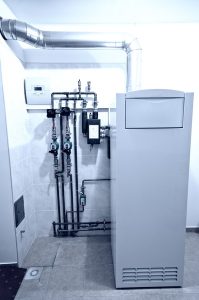 With few exceptions, all modern homes use electricity. But when it comes to home heating, electricity isn’t always the top choice. Natural gas, piped in through municipal lines, provides power to gas furnaces that are fast and effective at heating up a home during the winter. However, the option always exists to have an electric furnace instead. Furnaces are a flexible type of heating system, with different models using a range of energy sources. That’s why it’s easy for furnace installation experts to find a furnace to match almost any house. Regular furnace maintenance is crucial to ensure the longevity and efficiency of both gas and electric furnaces.
With few exceptions, all modern homes use electricity. But when it comes to home heating, electricity isn’t always the top choice. Natural gas, piped in through municipal lines, provides power to gas furnaces that are fast and effective at heating up a home during the winter. However, the option always exists to have an electric furnace instead. Furnaces are a flexible type of heating system, with different models using a range of energy sources. That’s why it’s easy for furnace installation experts to find a furnace to match almost any house. Regular furnace maintenance is crucial to ensure the longevity and efficiency of both gas and electric furnaces.
Gas furnace and electric furnaces remain the two most common choices. Is there one that’s automatically a better option than the other? Let’s take a closer look at them to provide an answer to that question—but we’ll tell you upfront that the answer is “it depends on your home’s needs.” Trust to HVAC professionals to ensure you have the best possible HVAC system installation.
Understanding Furnace Options
What is a Gas Furnace?
A gas furnace is a type of heating system that uses natural gas or propane to warm your home. Like any heating system, gas furnaces can experience common furnace problems that need timely attention to maintain efficiency. It operates by burning fuel to produce heat, which is then distributed throughout the house via a network of ducts. Gas furnaces are favored by many homeowners due to their high efficiency and reliability. They are particularly effective in delivering consistent warmth, even during the coldest months. Additionally, gas furnaces are relatively affordable to install and maintain, making them a cost-effective option for home heating. With a gas furnace, you can enjoy a cozy home without worrying about skyrocketing energy bills.
What is an Electric Furnace?
An electric furnace is a heating system that uses electricity to generate heat for your home. It works by converting electrical energy into heat, which is then circulated through the house using a system of ducts. Electric furnaces are popular among homeowners because of their low upfront cost and ease of installation. Unlike gas furnaces, they don’t require a natural gas line, making them accessible for virtually any home. However, it’s important to note that electric furnaces can be more expensive to operate, especially in areas where electricity rates are high. Despite this, their simplicity and lower initial investment make them an attractive option for many.
Pros & Cons of Gas Furnaces: Energy Efficiency Considerations
- Benefits: Gas furnaces are among the most powerful residential heating systems, putting out levels of heat few other systems can match. No matter how cold it may be outside, a gas furnace can keep a house toasty warm. This is especially beneficial in older homes that suffer from drafts due to poor insulation. Natural gas is an inexpensive fuel source, and it burns cleanly, making it a good option for saving money and helping the environment. Natural gas is also convenient, coming directly to a house through municipal piping, unlike other heating oils such as propane. A high efficiency gas furnace can further enhance these benefits by providing even greater energy savings and consistent heating performance.
- Drawbacks:There are potential health hazards from using natural gas in a house, although modern gas furnaces are built with safety as a priority. Issues with the heat exchanger can lead to significant problems and may require complete furnace replacement. Gas furnaces also wear down faster than other types of heaters and may need a replacement early. Finally, not every home has access to natural gas. A functioning furnace has a blue burner flame; a yellow flame can indicate a problem with carbon monoxide.
Electric Furnace: Advantages and Disadvantages
- Benefits: Pretty much any home can use an electric furnace, since it doesn’t require a natural gas line. An electric furnace is reliable and needs fewer repairs over its lifetime—and that lifetime is frequently longer than a gas furnace’s. An electric furnace generally costs less to install upfront, and it doesn’t create hazards from possible toxic gas emissions.
- Drawbacks: An electric furnace doesn’t have the raw heating power of a gas model. It also costs more to operate than a gas furnace because electricity is a costlier energy source—and an electric furnace uses an immense amount of electricity to run. This is somewhat offset by the lower installation cost and smaller number of repairs, but a household can expect high electrical bills over the winter.
The Benefits and Drawbacks of Electric Furnaces: Impact on Heating Costs
- Benefits: Pretty much any home can use an electric furnace, since it doesn’t require a natural gas line. An electric furnace is reliable and needs fewer repairs over its lifetime—and that lifetime is frequently longer than a gas furnace’s. An electric furnace generally costs less to install upfront, and it doesn’t create hazards from possible toxic gas emissions. Alternatively, a heat pump can be a more energy-efficient option for homeowners looking to reduce their heating costs.
- Drawbacks: An electric furnace doesn’t have the raw heating power of a gas model. It also costs more to operate than a gas furnace because electricity is a costlier energy source—and an electric furnace uses an immense amount of electricity to run. This is somewhat offset by the lower installation cost and smaller number of repairs, but a household can expect high electrical bills over the winter.
Energy Efficiency and Costs
Energy Efficiency Comparison
When it comes to energy efficiency, gas furnaces generally have the upper hand. They typically boast an Annual Fuel Utilization Efficiency (AFUE) rating of 80-90%, meaning that 80-90% of the energy consumed is converted into usable heat. On the other hand, electric furnaces often have an AFUE rating of 95-100%, but the higher cost of electricity can make them more expensive to run.
In terms of costs, gas furnaces usually come with a higher installation price tag compared to electric furnaces. However, they can be more economical in the long run. According to the U.S. Department of Energy, a gas furnace can save homeowners up to $400 per year in heating costs compared to an electric furnace. The actual savings can vary based on the size and efficiency of the unit, as well as installation costs. Most homeowners can access a cash incentive for a new gas furnace from the Energy Trust of Oregon.
High-efficiency gas furnaces, with AFUE ratings of 90% or higher, are available and can offer even greater energy savings. While these models may be more expensive to install, they can significantly reduce your energy bills over time, making them a wise investment.
Ultimately, the decision between a gas furnace and an electric furnace depends on several factors, including the size and layout of your home, the local climate, and your budget and preferences. Consulting with a professional HVAC technician can help you determine the best heating solution tailored to your specific needs. Custom fitting a furnace to a home ensures optimal installation and operation costs.
Professional Furnace Installation and Furnace Replacement
Choosing the right heating system, either as an initial installation or a replacement, can be tricky. You have to find an excellent HVAC contractor to see you are matched with the ideal new furnace or other type of heater.
Choosing the right heating system, either as an initial installation or a replacement, can be tricky. Evaluating whether a furnace replacement is necessary often involves assessing the age and performance of your old furnace. You have to find an excellent HVAC contractor to see you are matched with the ideal new furnace or other type of heater. Having access to emergency furnace repairs is crucial to address urgent heating issues promptly.
If you’re looking for that great HVAC company in Florence, OR to help with a furnace installation or replacement, you’ve already found the right people for the job! We’ve been in business offering service throughout Florence and the surrounding areas for more than 50 years.If you’re looking for that great HVAC company in Florence, OR to help with a furnace installation or replacement, you’ve already found the right people for the job! We’ve been in business offering service throughout Florence and the surrounding areas for more than 50 years.
Comfort Flow Heating offers service to all of Oregon. We have 24-hour assistance available.

